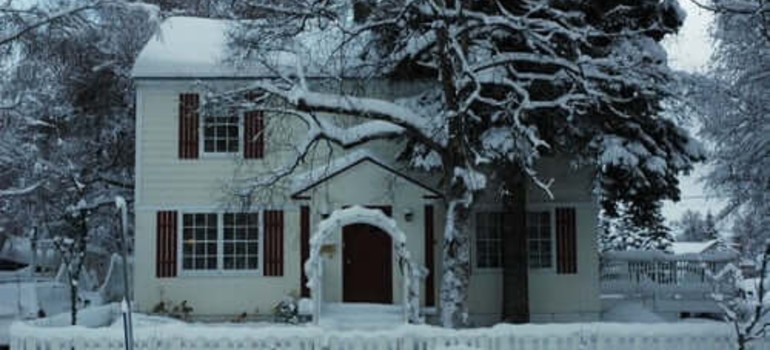
Photo by Wonderlane on Unsplash
Winter is the time of the year when we wait impatiently because bugs disappear. But how true is this statement? Sure, there are no mosquitoes or fly swarms outside, but have you noticed that there seem to be more pests in your home in the colder months?
So, where do insects go in wintertime? Bugs need a survival plan to endure the chilly winter weather and the approach differs between different species. If you want to know what happens to bugs in winter, keep reading.
Table of Contents
Where do bugs go in the winter?
Insects use various strategies to endure cold weather and survive during winter including:
- Migration – this seasonal movement from colder to warmer climates allows bugs to escape harsh temperatures. It may entail moving southward or relocating to a nearby warmer location, such as sheds, basements or garages. Crop pests are among the most noticeable insects that migrate.
- Diapause – Insects undergo diapause by entering a state of dormancy, effectively halting their development and lowering their metabolic rates. This adaptation occurs in reaction to unfavourable environmental conditions, and dormancy concludes once temperatures rise.
- Hibernation – During the cold winter months, insects face challenges obtaining food, prompting them to enter a state of hibernation. This process entails a decrease in body temperature and water levels, accompanied by an increase in glycerol.
- Larval overwintering – Many insects successfully survive the winter in their immature larval stage. Some of them find protection under thick layers of leaf litter, while others convert the water in their bodies into glycerol, functioning as a natural antifreeze. Some bugs simply dig deeper into the soil to avoid the cold.
- Nymphs – during this stage bugs continue to feed and grow throughout the winter, emerging as adults in early spring.
- Laying eggs – when faced with extreme survival circumstances, numerous insects lay their eggs to ensure the continuation of their species in the upcoming spring.
Do spiders hibernate?
Contrary to popular belief, most spider species do not invade our homes when the temperatures drop. Some species of spiders actually do hibernate, while most simply die off if it gets too cold. Otherwise, they may seek some outdoor shelter and survive through the winter because spiders are cold-blooded and more adapted to it than humans.
One exception to this is the Brown Recluse Spider, which we have plenty of in the UK. They are most likely to try and hide inside your home. On the other hand, most spiders that hang from cobwebs in your home have been there before the winter.
One thing you should know is that spiders lay eggs before the winter, and the eggs can survive the cold temperatures and emerge as adults in spring.
Do flies hibernate?
The larvae or pupae of the flies can survive through the winter in a dormant state. Adult flies have a lifespan of no more than 15-24 days, and they do not hibernate. What may happen is that the female adults lay eggs in warm places in autumn.
However, cluster flies and various other species may enter a state of diapause during the winter months. This semi-dormant condition enables flies to conserve heat and energy in unfavourable climatic conditions. Unlike true hibernation, diapause is temporary. As soon as temperatures increase, flies can awaken and resume their activities, including hunting and dispersing.
Where do fleas go in the winter?
Fleas die in winter when the temperatures outside drop below 3-4 degrees Celsius, no matter which stage of their life cycle they are at. However, they will remain active if they are inside your home. The pupae stage of fleas can be dormant in colder areas such as your basement, but as soon as temperatures begin to rise, they will infest your house.
Our homes, which are kept warm throughout winter, provide an ideal shelter for fleas, enabling them to lay eggs and continue their life cycle. Consequently, flea infestations can become quite severe indoors during this season, as fleas remain protected from the cold outside.
This situation is quite common in households with pets, as fleas can easily thrive on warm-blooded hosts like cats and dogs. Therefore, it is a common misunderstanding that pets are immune to flea infestations in winter.
Do wasps hibernate in winter?
Yes, they do. Come autumn, wasps seek warm places where they can spend the coldest months. Naturally, many of the wasps from a nest die off in autumn, but the ones that survive must hibernate.
Very often, the ones that survive are the queen wasps so they can begin the nest anew when the time comes. Wasps hibernate in hollow trees or holes in buildings’ structures. They will not enter your home in seek of shelter.
Check also:
Insects that come out in winter
In winter, there are no insects outdoors because it’s simply too cold for them to survive, and there’s no food. So, here are the top 5 insects that come out in winter:
Cockroaches
Cockroaches are not afraid of the winter. They are alive and active all year round, some months more than others. In winter, they can be spotted in your home as well. Take some timely measures yourself, like placing baits and poison but if they don’t work, call a professional cockroach exterminator for help as they use stronger products.
Spiders
Most of the spiders you’ll have in your home in winter are already there. They will not rush to your home once the temperatures drop. However, you can bring spiders inside with firewood.
Some species, like the Brown Recluse Spider in the UK, may invade your home for shelter and food, as both will be gone outdoors in the winter.
Fleas
Fleas are parasites that are attracted to the warmth of your pet’s body. Naturally, when temperatures outside drop, they must quickly find a host to survive on. This can quickly turn into a flea infestation in your home. Once they are inside a warm environment with an abundance of food, they will reproduce rapidly.
Flies
When the temperatures decrease, flies may quickly get oriented to find an entrance to your home. Well, those that are alive. Since they are not cold-blooded, they are not able to survive for long outside.
Adult flies do not have a long lifespan, so they may quickly die off even after they’ve hidden from the cold in your home. But they can lay eggs around your home and, when hatched, they can turn into an infestation.
Ants
Since winter is a time of food scarcity for animals outside, ants are very likely to come looking for food indoors. If there’s an easy entryway to your home and food scraps easily available, you could get an ant infestation in the winter.
Check also:
Why do you get more bugs in winter?
Not all insects are dormant during the cold months and some species remain active throughout the entire year. Naturally, as the temperatures outdoors drop and there is no food available, insects look for shelter and food inside your home.
As soon as they can find an entrance into your home, they will make it their own as well. Rodents such as rats, mice and squirrels are the most common home invaders, and so are some insect species.
What is more, you can bring bugs inside your home with firewood or with your laundry. So, pay attention when bringing these two types of items inside your home. Waggle the laundry and pieces of firewood before going inside to prevent bugs from getting into your home.
Are you dealing with a pest infestation?
You don't have to be alone in the battle against pests. Hire a professional pest expert!
Call usHow to prevent bugs from getting into your home in winter?
To stop rodents and insects from entering your home this winter, you have to ensure that there are no entryways. Inspect your house for gaps or cracks in walls and floors, holes, loose windows or doors, etc. as well as check the roof.
Other things you can do to keep pests away in winter or any other season:
- Regularly take out the trash;
- Regularly wipe kitchen counters and vacuum;
- Install window and door nets;
- Keep pantry and food well sealed;
- Do not leave standing water anywhere inside or around your house;
- Buy a drain cover to use when you’re not at home.
If pests get inside even after all of your preventive measures, you will need to get a professional pest control expert to take a look at the premises.
Conclusion
While winter may seem like a bug-free season, it can actually lead to more insects seeking shelter inside our homes. Many pests, such as fleas and flies, find warmth and protection indoors, thriving in the cosiness of our heated spaces.
Simple steps like sealing cracks, taking out the trash regularly, and safeguarding food and water sources can prevent infestations during the colder months. And if bugs still manage to invade, seeking professional help is often the most effective solution.
Winter may relieve some pests, but vigilance is key to keeping your home bug-free all year round.

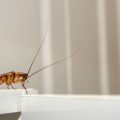


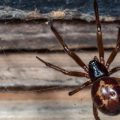
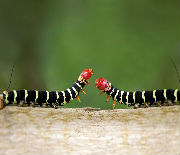
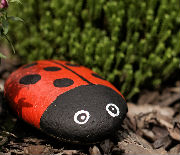
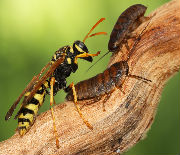
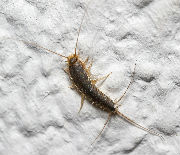
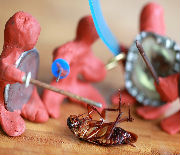
The best option to prevent any insects and most importantly mosquitoes is to fix an insect screen on the window. This is the most effective way to safeguard us from poisonous and diseases spreading insects.